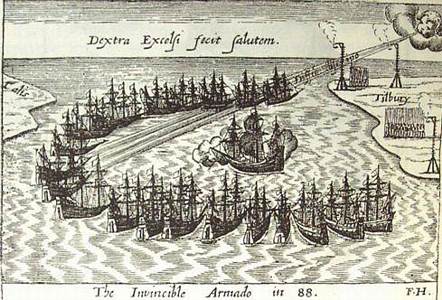The Armada (2)
In 1586, following Elizabeth's open alliance with Dutch rebels, Philip began the building of an "Invincible Armada" which would finally rid Europe of the heretic Queen.
Drake the devil (El Draque) delayed the Armada's launching by a raid on Cadiz harbour, but in the summer of 1588 it finally set out for Calais.
The battle begins . . .
In Calais the fleet was to pick up troops from the Netherlands and ferry them across the Channel for the invasion. An English army gathered at Tilbury, just outside London, where the Queen spoke* to them.
After an inconclusive engagement with the English at sea, the great armada was thrown into confusion by English fire ships sent among them while anchored at Calais. Unable to pick up the invasion troops, the Spanish ships were forced by prevailing winds to return home around the north of England; storms wrecked almost half of the fleet, and disease caused by malnutrition carried off a large percentage of the crewmen that remained.
A famous victory
The disgrace to Spain greatly damaged its prestige and marked the beginning of its decline as a European power; conversely, England's star was on the rise.
Elizabeth--and Protestants throughout Europe--took the defeat of the Armada as a sign of divine blessing* for their cause. English patriotism and devotion to the Queen soared to its greatest heights, shown in part by a profusion of literature that included Shakespeare's first plays--patriotic histories of the English monarchy.
Footnotes
-
"We happy few. . ." (Part Two)
. . . I am come amongst you, as you see, at this time, not for my recreation and disport; but being resolved in the midst of the heat of the battle to live or die amongst you all; to lay down for my God and for my Kingdom and for my people my honor and my blood even in the dust.
I know I have the body but of a weak and feeble woman; but I have the heart and stomach of a king, and a king of England too, and think foul scorn that Parma or Spain or any prince of Europe should dare to invade the borders of my realm; to which, rather than any dishonor should grow by me, I myself will take up arms; I myself will be your general, judge, and rewarder of every one of your virtues in the field. . . . -
The breath of Providence
On the defeat of the Armada, Elizabeth had a coin struck in commemoration of the victory. The motto on the coin read, "God blew and they were scattered."
